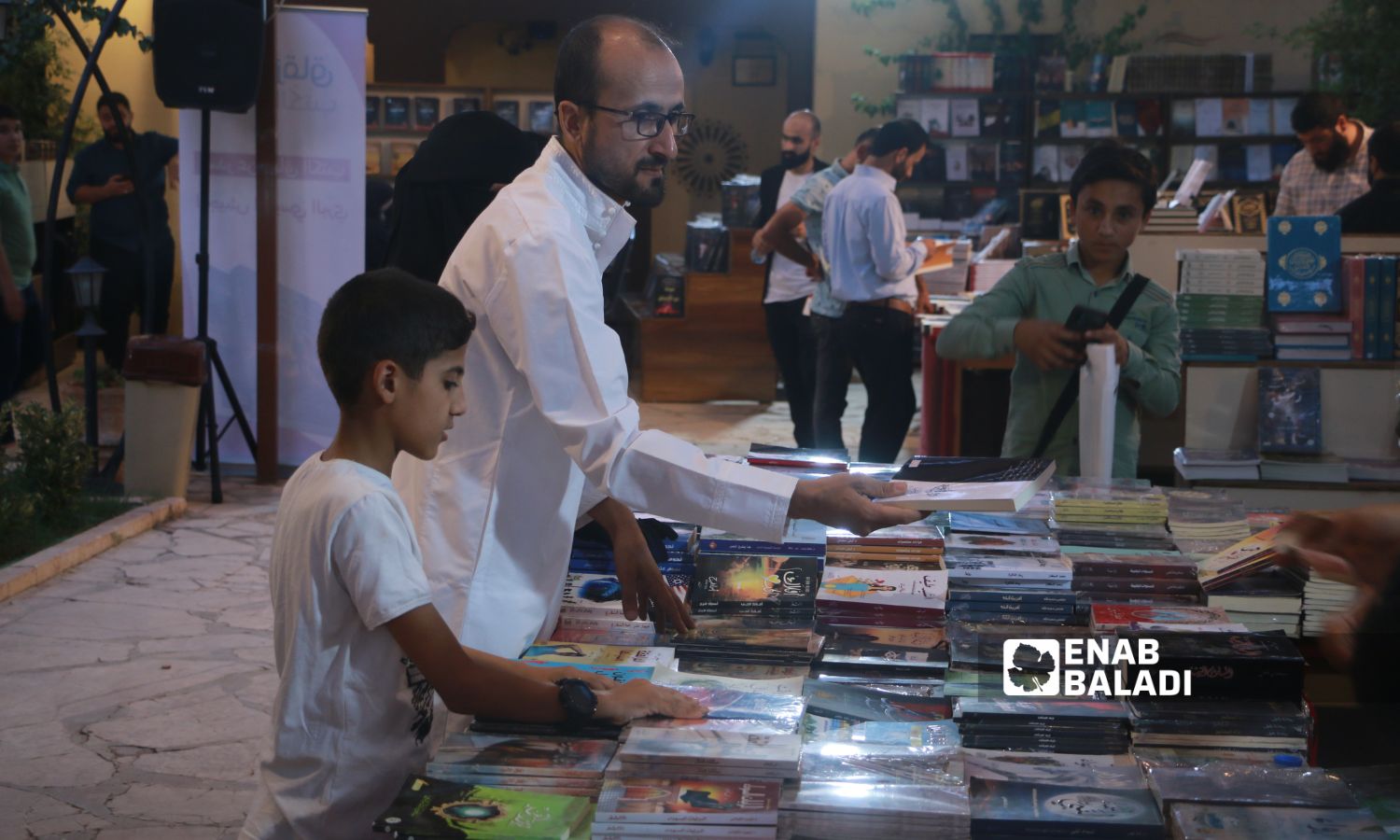



The city of Idlib, northwestern Syria, under the control of Hayat Tahrir al-Sham (HTS), witnessed the third edition of the book exhibition held from September 5 to 15.
The exhibition, held at the Arab Cultural Center, saw the attendance of Tahrir al-Sham leader, Abu Mohammad al-Jolani, along with public figures and social media influencers.
Before its commencement and during its events, Tahrir al-Sham promoted the exhibition through its official figures and those close to it.
Al-Jolani’s appearance at the exhibition event came months after a public protest movement demanded his departure and changes in the leadership faces of Tahrir al-Sham, which witnessed the departure of its prominent figures due to disagreements with al-Jolani over recent months, including Abu Maria al-Qahtani.
The promotion and attention given to the book exhibition suggest that there are reasons beyond just cultural activities needed by the city, which hosts displaced people from all Syrian cities. It also indicates a process of promoting Tahrir al-Sham itself and sending internal and external messages.
Some analysts believe that these activities represent an attempt to improve Tahrir al-Sham’s image internationally and a means to solidify its cultural and intellectual control in the region.
Syrian political researcher Nader al-Khalil told Enab Baladi that al-Jolani’s attendance at the book exhibition’s opening carries multiple messages, reflecting Tahrir al-Sham’s interest in showcasing its capability to maintain control and stability in the region despite internal and external challenges.
He added that the step not only aims to enhance Tahrir al-Sham’s internal image but also to send a clear message to the international community about its ability to effectively manage the region.
This event can also be seen as part of a larger strategy to embed the ideology adopted by Tahrir al-Sham in northwestern Syria, according to his opinion.
Cultural events and seminars organized by Tahrir al-Sham play a role in reinforcing its intellectual and political discourse and directing public opinion in line with its vision, al-Khalil noted.
The book exhibition included cultural seminars, theatrical performances, and attendance by figures absent from the Syrian military and political scene, such as the founder of the former Free Syrian Army (FSA), Riyad al-Asaad.
The head of the Syrian Salvation Government (SSG), Mohammed al-Bashir, also attended the opening ceremony alongside al-Jolani, both delivering speeches at the Arab Cultural Center’s stage.
The Salvation Government is considered the political umbrella for Tahrir al-Sham, overseeing areas in Idlib and parts of western Aleppo, eastern Latakia, and northern Hama.
Al-Jolani linked culture to development in his speech, claiming that “a new dawn is emerging from Idlib with its eyes on Damascus,” promising “victory,” and speaking about stability in his controlled areas.
He added that the book exhibition expresses “the general trend to support the knowledge system” in the region.
The exhibition came months after protests in areas controlled by Tahrir al-Sham, demanding al-Jolani’s departure.
The protests began at the end of February, against the backdrop of the “treason” file and the accompanied arrests carried out by Tahrir al-Sham against its leaders, military figures, and civilians, leading to torture and several deaths.
The protest movement is led by civilian activists and supported by well-known military and religious figures in Idlib, focusing on rejecting Tahrir al-Sham’s sole decision-making policy.
Conversely, Tahrir al-Sham varied its response to demonstrations, using dialogue and promises of reform at times, and repression at other times through its security forces, including arrests, dispersal of demonstrations by force, and attempts to prevent large gatherings of protesters.
According to al-Khalil, the recent protests highlighted the fragility of the situation there, despite Tahrir al-Sham’s attempts to portray stability, and al-Jolani’s presence at the book exhibition can be seen as a show of strength, aiming to reassure supporters and suppress opponents.
Stability does not only mean the absence of violence; it also includes factors such as economic well-being, access to basic services, and freedom of expression. The protests and the evolving situation indicate that these aspects are lacking, leading to underlying discontent, according to al-Khalil.
In addition to al-Jolani’s appearance, figures close to Tahrir al-Sham promoted the exhibition, whether through widely spread Telegram groups in the region or via social media and press articles.
Journalist Ahmad Muaffaq Zaidan, one of the prominent defenders of Tahrir al-Sham and its policies in Idlib, published an article in Qatar’s Al-Sharq newspaper, considering the exhibition an indication of the educational, health, and service conditions in Idlib today.
In an article published on September 3, he added that the conditions in the city are better than in other controlled areas across Syria, similar to what al-Jolani mentioned in his speech during the exhibition’s opening.
In a second article published on September 10 in the same newspaper, he claimed that “Idlib’s preoccupation with its exhibition stole the spotlight and praises.”
Zaidan wasn’t alone in promoting the book exhibition in Idlib, as several social media accounts carried out the same promotion.
Assisting researcher at the Omran Center for Strategic Studies, Fadl Khanji, told Enab Baladi that al-Jolani is promoting himself not only as the leader of Tahrir al-Sham but as a political figure and the real leader of the de facto authority in northwestern Syria.
This can be seen through the continuous promotion of events in areas controlled by Tahrir al-Sham, based on his opinion.
Meanwhile, researcher Nader al-Khalil believes that the selection of speakers and topics at the book exhibition was likely to reflect the ideology and direction of Tahrir al-Sham, raising concerns about “possible indoctrination” and the suppression of opposing voices.
if you think the article contain wrong information or you have additional details Send Correction